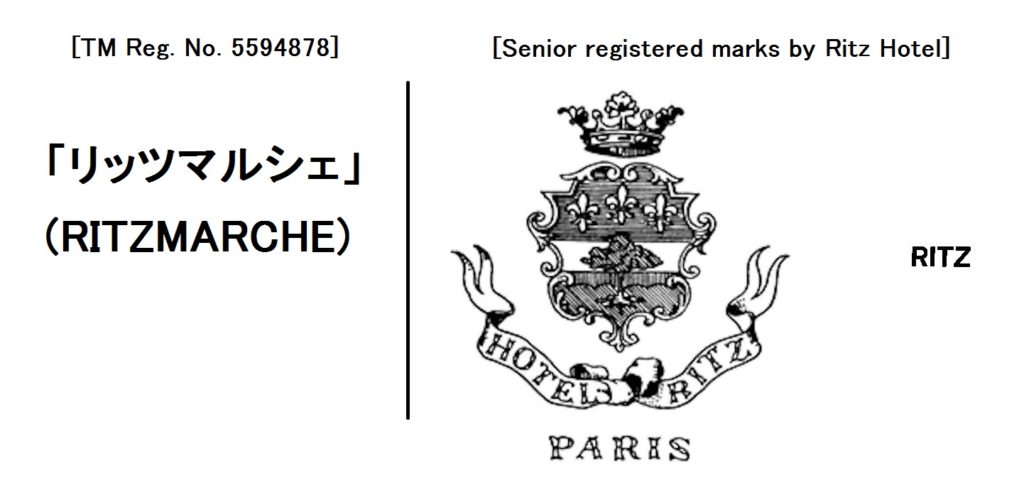Invalidation trial
The Japan Trademark Law contains provision for invalidation of trademark registration by means of inter partes trial in Article 46 as a remedy to questionable ex-officio examination of the Japan Patent Office (JPO).
Statistically, approximately 100 invalidation petitions were filed to the JPO in each of the past five years. Nearly 40 percentages of them ended successfully in an invalidation of registered mark in question on average.
[Trademark invalidation trial]
| Year | Number of cases | Disposition of trial | ||
| Invalidation | Dismissal | Withdrawal | ||
| 2015 | 100 | 37 | 58 | 19 |
| 2014 | 115 | 38 | 32 | 15 |
| 2013 | 96 | 37 | 53 | 10 |
| 2012 | 118 | 44 | 76 | 16 |
| 2011 | 112 | 38 | 57 | 9 |
RITZ v. RITZMARCHE
Ritz Hotel Ltd., a world famous hotel management company, petitioned for invalidation of trademark registration no. 5594878 for a word mark “RITZMARCHE” (written in Katakana letter) covering “retail services or wholesale services for foods and beverages” in class 35 pursuant to Article 46 of the Trademark Law on the following grounds.
- Consumers are likely to confuse or associate the mark in dispute with Ritz Hotel due to remarkable reputation bestowed on famous hotel brand, “RITZ”.
- “RITZMARCHE” is deemed confusingly similar to senior trademark registrations owned by Ritz Hotel Ltd.
[Marks in dispute]

Ground 1 corresponds to on Article 4(1)(xv) of the Trademark Law to prohibit any mark likely to cause confusion with a business of another entity from being registered.
Ground 2 rests on Article 4(1)(xi) to bar registration of a junior mark which conflicts with any senior trademark registration due to similarity of both marks and goods/services.
It becomes a common practice to raise several grounds in an invalidation petition. Combination of Article 4(1)(xv) and 4(1)(xi) is a standard tactic in trademark dispute involving a famous brand. Theoretically, Article 4(1)(xv) can’t be applied unless Article 4(1)(x) is inapplicable to the case. Article 4(1)(xi) is useful to the extent the marks as well as goods/services in question are identical or similar. In the meantime, Article 4(1)(xv) targets a wider territory where consumers are likely to confuse the source of origin between marks. In other words, Article 4(1)(xv) becomes helpful only where both marks are dissimilar, or goods/services in question are deemed dissimilar. Due to a wider protection to Article 4(1)(xv), a petitioner who claims the article is required to prove high recognition and substantial use of an opposing mark accordingly.
It is of no matter that JPO renders an invalidation decision simply based on Article 4(1)(xi) without reference to Article 4(1)(xv).
On the Ritz case, the JPO Trial Board held to invalidate registered mark “RITZMARCHE” on the grounds of Article 4(1)(xi).
Board decision
In the assessment of similarity, the Board considered a term “MARCHE” is less distinctive or inherently descriptive in connection with “retail services or wholesale services for foods and beverages” of class 35 since the term itself means “market” in French. Besides it can be seen often as a sign to indicate a place where merchants provide foods or beverages directly to consumers in Japan. Meanwhile, average consumers with an ordinary care are unlikely to perceive any descriptive meaning from the term of “RITZ”. Therefore, in the configuration of disputed mark “RITZMARCHE”, it should be allowed to extract the term “RITZ” as a prominent part of the mark.
In comparing the Katakana letter of “Ritz” with alphabetical term “RITZ” of cited marks, both have same sound. Their meaning is incomparable since both don’t give rise to specific meaning. Both terms are different in appearance, however, it becomes commercially routine to write alphabetical names in Katakana letters for purpose of representing pronunciation of the terms in fact. Based on the foregoing, the Board concluded that “RITZMARCHE” and Ritz Hotel registered marks containing a term of “RITZ” are confusingly similar as a whole, by taking into consideration of relevant factors in commerce relevant to disputed goods/services. The Board also held that “retail services or wholesale services for foods and beverages” in class 35 is considered similar to food products in class 30 designated under the citations.
[Invalidation case no. 2016-890033]
The Board didn’t refer to Article 4(1)(xv) although Ritz Hotel argued famousness of cited mark “RITZ” with enormous amount of evidential materials as mentioned reason.
If Ritz Hotel has filed the invalidation action solely based on Article 4(1)(xv), the JPO must have admitted famousness of the mark “RITZ” and invalidated “RITZMARCHE” likewise.
NEW TRADEMARK EXAMINATION GUIDELINE
In April 2017, the JPO announced new trademark examination guideline [Revision 13].
The guideline aims to reflect recent judicial decisions and non-traditional trademarks. Inter alia, Article 4(1)(xi) is hot topic due to its significance as a key provision pertinent to assessment of mark similarity. From now on, it is more likely that the JPO admits an argument of prominent part of trademark than before, even if the mark consists of other words or figurative elements.
I suppose, the RITZ case is timely ruled in line with New Guideline.
 MASAKI MIKAMI, Attorney at IP Law – Founder of MARKS IP LAW FIRM
MASAKI MIKAMI, Attorney at IP Law – Founder of MARKS IP LAW FIRM


Be the first to comment on "Famous hotel brand “RITZ” successful in invalidating “RITZ MARCHE”"